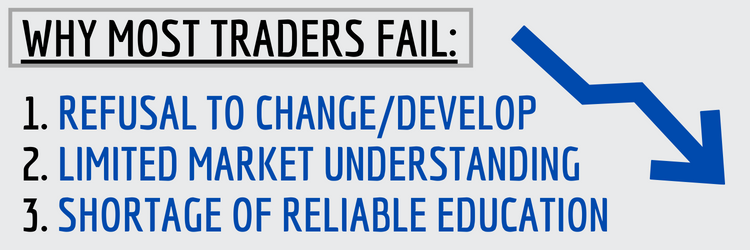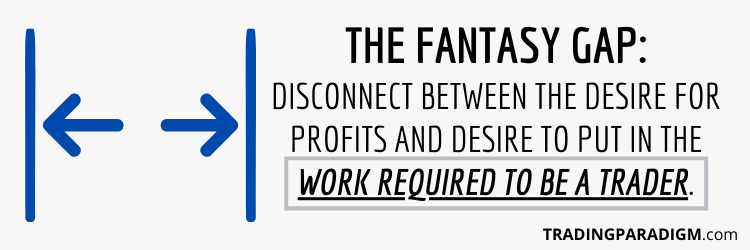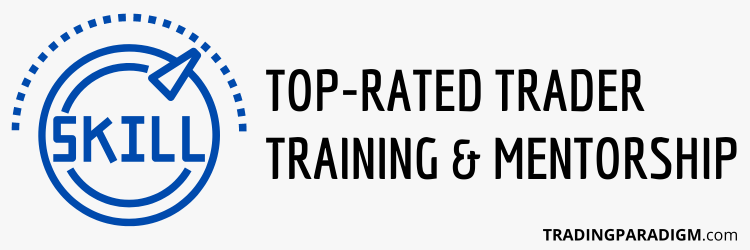Why Most Traders Fail – and How You Can Be Part of the 10% That Succeed:
The exact percentage of traders that fail is difficult to accurately calculate. But the general consensus is that somewhere around 90% consistently lose money – and this might even be a conservative figure. Some believe it to be as high as 95-99%.

This is often a shocking statistic for beginners to hear – and it typically turns them off to giving trading a real shot. They assume they have virtually no chance at succeeding since most others don’t. But that’s because most others don’t approach trading the right way.
We’re talking about an environment with virtually no barriers to entry (almost anybody can open up a brokerage account and start trading within a day or two), along with the potential for generating massive personal wealth (so of course it attracts hordes of people).
But there’s a gigantic difference between “trading” and “being a trader”. Any random person can push buy and sell buttons within their brokerage platform just fine. But it takes much more than impulsively pushing buttons to be a consistently profitable trader.
To use a sports analogy, there are no minor leagues in the markets. Everything is the majors. So when you have low-skilled, inexperienced amateurs going up against professional-level traders – who do you think is going to consistently win?
It would be like taking people off the street to play in NFL games. It’s one thing to participate, but 99%+ won’t perform very well.
3 Primary Reasons Why Traders Fail – Recognize Them to Avoid the Same Fate:
There are a ton of specific reasons that could be listed for why traders fail. In fact, I’ve written a fairly long article in the past covering the 10 Biggest Mistakes New Traders Make. But in my experience, all the reasons for failure fall into one of three main categories:
1. Avoidance of Personal Change/Development
Generally speaking, people are lazy. And I don’t mean this to be a personal shot at you specifically – it’s just the truth. It’s the law of least effort. People often have a lot to say in regard to their desires, but there’s not typically a lot of action to back it up.
To put it plainly, people want results without the work. It’s extremely easy to want the money and lifestyle that trading can potentially afford. But it’s hard to consistently perform the tasks required to achieve that result (journaling, trade tracking, etc.).
This is why things like alert/signal services, newsletters, and chat rooms are so popular – because people try to use them to avoid personal behavior change. They think that blindly copying somebody else’s trades will be effective – but it never is.
I’m not saying that all of these types of services are completely useless. Some can actually be quite beneficial if used correctly. But, unfortunately, most people don’t use them for building skills and self-sufficiency; they use them for copying and dependency.
- Failure is Only Feedback – Use Losses and Mistakes to Grow
- There Are No “Naturals” – Great Traders Aren’t Born, They’re Made
- Transform Yourself Into the Trader You Want to Be in 3 Steps
In order to become a consistently profitable trader, there’s no avoiding the personal change and development that the market demands. Nobody can magically bestow new habits and skills upon you – you have to take action toward developing them for yourself.
2. Limited Understanding of How Markets Work
Along with the resistance of personal change and development, another big reason for failure is a limited understanding of how markets truly work. Instead of actually learning market dynamics and structure, most people rely on cookie-cutter patterns/setups.
But if simple price patterns like double tops/bottoms, head and shoulders, etc. – which are often construed as strong technical patterns – were actually magical answers to trading success, then far less than 90% of traders would fail.
A five-year-old child can understand basic price patterns – so there’s obviously much more to it than that. Markets are dynamic, complex systems that require contextual analysis, adaptation, and nuance. Basic patterns (without context) are complete nonsense.
My intention isn’t to force a specific framework or way of viewing markets on anybody. But if you’re feeling confused by how markets move, then I highly recommend studying auction market theory and the profiling tools often used in conjunction with it.
- What is Auction Market Theory – Trading Value vs. Price
- What is Profile Trading – Volume Profile & Market Profile
- Volume Profile Trading – What Does Volume Profile Tell You?
This framework removes a blinding mask from the eyes of most traders. What once seemed incredibly chaotic and random becomes substantially more orderly and structured. It provides a level of clarity and depth that most don’t even realize exists.
3. Shortage of Reliable Education and Training
The shortage of reliable education and training isn’t just the result of self-proclaimed gurus looking to make as much money as possible off naive newbies. It’s also the result of the first point we talked about – our natural avoidance of behavior change.
The sad reality is that most people don’t want to change or improve themselves. They often want their circumstances to change, but taking the time and effort to build new habits and skills is daunting. What’s a lot more enticing is to be spoon-fed “hot picks”.
When blindly mirroring alerts/signals/hot picks is what the masses want, of course some salesmen/marketers are going to create products/services that feed on your desire for instant riches (regardless of whether or not they work – and they don’t).
As a result, we have a trading education industry full of useless information, ineffective shortcuts, and all kinds of other nonsense. It’s a landscape bursting with distraction and entertainment as opposed to legitimate education and training.
- Trading is a Skill – Knowledge Will Only Get You So Far
- Entertainment vs. Training in the “Trading Education” Space
- Best Day Trading Education, Training & Mentorship Programs
What most new traders want (easy answers) is not what they actually need to be successful (legitimate education and training). Great trading education/training programs are rare because most people prefer lousy, ineffective alternatives.
The Wrap-Up on Why Traders Fail and How You Can Be in the 10% That Succeed:
Overall, I think the 90% failure rate in trading is extremely misleading because it takes into account a massive number of people who have no desire or intention of taking the right approach (those who obsess over the potential results instead of the process).
But for those who actually focus on the right things (proper education/training, habit/skill-building, etc.), the failure rate is substantially lower. Working the hobbyists and compulsive gamblers into the equation undoubtedly skews the numbers.
This isn’t to say that becoming a consistently profitable trader is easy – that’s not what I’m saying at all. But grouping every market participant together (regardless of commitment, skill, experience, etc.) into one giant calculation is deceiving.
I have no real way to calculate it, but I would venture to guess that around 75% of individuals who were passionate about trading and pursued it the right way would actually succeed – and the main reason for failure would be not giving themselves enough time.
The bottom line is this – the vast majority of people approach trading the wrong way, and in doing so, essentially guarantee their own failure. But I firmly believe the numbers can be shifted around substantially for those who follow the right process.
Even though becoming a consistently profitable trader is no easy task, your chances might be far better than you think.
Learn More in the Trading Success Framework Course
Written by Matt Thomas (@MattThomasTP)
Related Pages:
- Why is Day Trading So Hard – The Realities of Day Trading
- Training For Day Trading – What is Training For Trading?
- 3 Critical Phases of the Trading Day – Prep, Trade, and Review
- The Market is a Mirror – Your Experience is a Reflection of You
- Values and Principles to Live By as a Trader – What’s Your Mission?







Shortage or lack of access to good and reliable education and training is one reason I have always attributed to people’s failure in trading. But I also agree that laziness remains one of the key reasons people fail. Many folks get easily frustrated when they do not see results in the first few weeks or months. They fail to put in the required effort to get the result.
The tricky part about trading is that short-term luck often fools people into thinking they actually know what they’re doing when in reality they absolutely don’t – more than any other undertaking that exists. For example, if you throw a random person with zero skill, competence, or experience into a professional football game – the odds that they perform well are essentially zero. They’re not going to get lucky and be the MVP of the game; it’s just going to be a complete disaster from both a physical and mental perspective. But when it comes to trading (which is also a skill-based, peak performance endeavor similar to football or any other sport), people don’t treat it anywhere near the same. And the reason is that there’s a lot more short-term luck/randomness at play in trading. The way most people approach it certainly isn’t sustainable, but they often get fooled by randomness. Short-term results blind them from what constitutes good trading (based on process).
Failure is common in the trading world. People want instant gratification and quick money. They enter the market. They may be successful 1-2 times out of 10. They believe in learning by trial and error. But to be successful needs real strong education and it may cost a good amount of money.
Brokerage companies like Fidelity want to teach women if they put $50.00 then fidelity guides them to trade learn and earn. I have not tried it yet. I lost money early in my trading career but now I am an investor mostly, However, I believe in a strong education for successful trading. I will review your other articles to see if I find something to educate myself. I like IQ virtual trading to learn but have to put enough time to learn it in real situations.
Hi Anusuya – thanks for sharing your thoughts and experiences!
People definitely tend to want instant gratification and it ends up sabotaging their long-term trading success. But good trading is often counterintuitive. What feels good in-the-moment is often the wrong decision. Too many market participants get caught up in short-term results, but it often comes at the expense of their long-term trading goals.
I haven’t heard of the opportunities you mentioned with Fidelity and IQ virtual trading, but I hope they’re offering high-quality education and training. Take care!